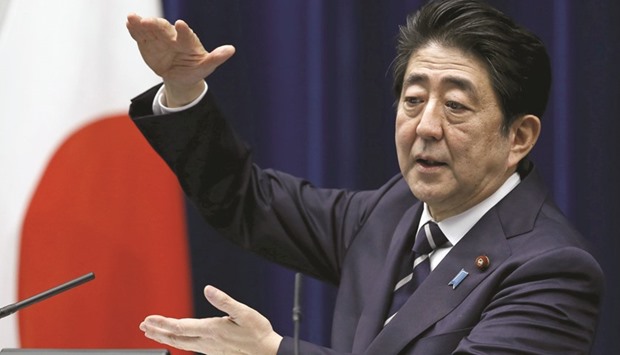Japan’s parliament approved a record ¥96.72tn ($851.5bn) state budget for fiscal 2016 yesterday, paving the way for a fully-fledged debate on additional stimulus spending to spur the flagging economy.
Prime Minister Shinzo Abe wants to front-load spending in the annual budget for the coming fiscal year starting in April and to adopt a fresh extra budget, while speculation is rife that he may again delay a sales tax increase planned for April 2017.
The budget was given final approval by the upper house of parliament, with the ruling bloc’s firm majority.
“We need to quickly implement this budget. I’ll instruct the finance minister to front-load spending where possible,” Abe told reporters.
Abe needs to strike a delicate balance between conflicting needs to curb the industrial world’s heaviest public debt burden and to revive an economy teetering close to another recession.
The government raised its initial budget spending estimate by about ¥400bn for fiscal year 2016 from ¥96.3tn in 2015.
But sources have told Reuters that the government already has begun considering a tax-hike delay and more fiscal stimulus, with people around Abe calling for additional spending of ¥5tn to ¥10tn to stimulate consumption.
Abe is expected to decide on the sales tax and stimulus spending around a May 26-27 Group of Seven summit that he will host, after analysing first-quarter GDP data due earlier that month.
Most economists expect a return to growth in the first quarter, albeit at very modest levels, but data released so far this year has been generally weak.
“As policy coordination by G7 is being called for, Japan must fulfil responsibility as chair. To realise sustainable and strong growth in global economy, I want to discuss with world leaders on how Japan should make a contribution,” Abe said. He stopped short of declaring adoption of fresh stimulus, while sticking to the standard line that he would proceed with the planned tax hike barring big economic shocks.
The April 2014 tax increase to 8% from 5% hit consumers hard, leading to a recession. It forced Abe to delay another tax increase to 10% – initially scheduled for last October – to April 2017.
“If they decide to go ahead with the tax hike, an extra budget would likely be around 10tn yen. If they delay it, the stimulus would be smaller at about ¥5tn,” said Kiichi Murashima, economist at Citigroup Global Markets Japan.
“Expectations for fiscal policy are rising worldwide due to a limit in monetary policy. But it would be quite hard for fiscal stimulus to boost the economy sustainably,” Murashima noted.
The 2016 budget features a bulging welfare outlay to cope with a fast-ageing population, with Abe taking advantage of higher tax revenue and low borrowing costs due to aggressive stimulus by the central bank, for boosting spending.

Abe: Wants to front-load spending in the annual budget for the coming fiscal year starting in April and to adopt a fresh extra budget.
